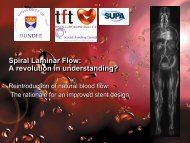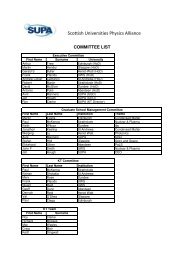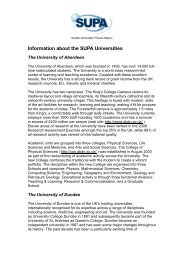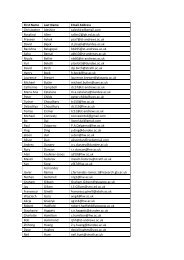Catalogue of Courses & Student Handbook - SUPA
Catalogue of Courses & Student Handbook - SUPA
Catalogue of Courses & Student Handbook - SUPA
You also want an ePaper? Increase the reach of your titles
YUMPU automatically turns print PDFs into web optimized ePapers that Google loves.
Condensed Matter and Material Physics<br />
Semester 1<br />
Advanced Statistical Physics (<strong>SUPA</strong>ASP)<br />
Lecturer: Davide Marenduzzo<br />
Institution: Edinburgh<br />
Hours Equivalent Credit: 22<br />
Assessment: Project Report<br />
This is a final year undergraduate course organised by the University<br />
<strong>of</strong> Edinburgh<br />
Course Description<br />
In this course we will discuss equilibrium phase transition, <strong>of</strong> the first and<br />
second order, by using the Ising and the Gaussian models as examples.<br />
We will first review some basic concepts in statistical physics, then study<br />
critical phenomena. Phase transitions will be analysed first via mean<br />
field theory, then via the renormalisation group (RG), in real space.<br />
We will conclude with some discussion <strong>of</strong> the dynamics <strong>of</strong> the approach<br />
to equilibrium.<br />
Condensed Matter and Materials Physics (CMMP) is a diverse subject<br />
covering many different specialities and attracts PhD students arriving<br />
from wide range <strong>of</strong> backgrounds with different balances <strong>of</strong> theoretical<br />
and practical training. The program <strong>of</strong> study is therefore tailored<br />
individually for each student, in consultation with his or her PhD<br />
supervisor. The overall range and level <strong>of</strong> courses <strong>of</strong>fered aim to<br />
introduce students to subject areas outside the immediate confine <strong>of</strong><br />
their thesis research, as well as providing more specialist knowledge<br />
directly relevant to each dissertation. It is envisaged that during the<br />
first two years <strong>of</strong> study every student will complete a minimum <strong>of</strong> two<br />
physics-content courses, at least one summer school, plus at least one<br />
module covering transferable skills. A typical program will comprise the<br />
following elements:<br />
CMMP courses organised by <strong>SUPA</strong>: These are either graduate<br />
specific or advanced masters courses made available to all centres over<br />
the <strong>SUPA</strong> videoconferencing network. <strong>Courses</strong> <strong>of</strong>fered are listed below<br />
and form the backbone on the CMMP graduate school programme.<br />
Core courses organised by <strong>SUPA</strong>: Those <strong>of</strong> particular interest to<br />
CMMP students include Advanced Data Analysis and courses in<br />
different programming languages such as C++ and Python.<br />
Non-<strong>SUPA</strong> course as appropriate (e.g. for students changing<br />
specialities)<br />
Summer Schools: Examples <strong>of</strong> appropriate summer schools include<br />
‘Physics by the Lake’ (St Bees School, Cumbria) for those with an<br />
interest in theory and HERCULES (Grenoble, France) for those doing<br />
research involving neutron and X-ray scattering at central facilities.<br />
Chaikin and Lubensky’s Principles <strong>of</strong> Condensed Matter<br />
(<strong>SUPA</strong>CLP)<br />
Lecturer: Mike Cates<br />
Institution: Edinburgh<br />
Hours Equivalent Credit: 25 (18 lectures & 7 tutorials)<br />
Assessment: Continuous Assessment<br />
For information only. This course is biennial and will not run in the<br />
year 2013/14, but will run again in 2014/15.<br />
Course Description<br />
This course will primarily involve a combination <strong>of</strong> directed reading<br />
and presentations by the participants on topics chosen from Chapters<br />
1-6 <strong>of</strong> the graduate text ‘Principles <strong>of</strong> Condensed Matter Physics’ by P.<br />
Chaikin and T. Lubensky (Cambridge University Press). The course will<br />
also entail group work and individual work on problems with hand-ins<br />
and/or teleconferenced presentation <strong>of</strong> solutions by the participants.<br />
Assessment will be based on performance in both the student<br />
presentations and selected problems.<br />
Computational Chemistry (<strong>SUPA</strong>CCH)<br />
Lecturer: Herbert Fruchtl<br />
Institution: St Andrews<br />
Hours Equivalent Credit: 9<br />
Assessment: Continuous Assessment<br />
Course Description<br />
The course will provide an introduction to practical computational<br />
chemistry techniques. The focus is on an introduction to the current<br />
state-<strong>of</strong>-the-art computational chemistry codes together with the theory<br />
behind the methods. Ab initio, DFT and classical methods, as well as<br />
cheminformatics, will be introduced along with how they are used in<br />
practice by researchers in Scotland.<br />
Transferable skills modules<br />
<strong>Courses</strong> <strong>of</strong>fered by other themes<br />
12







